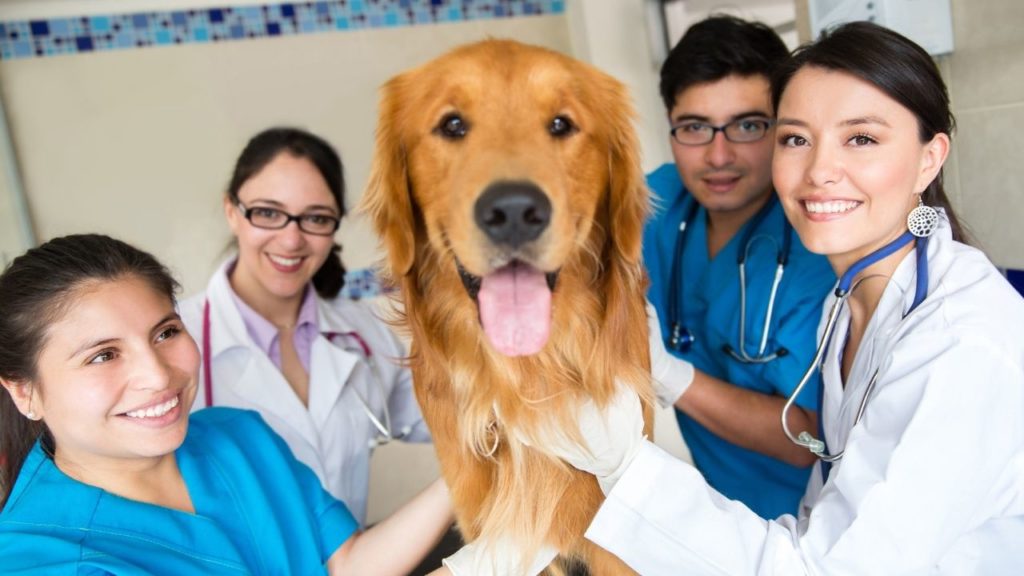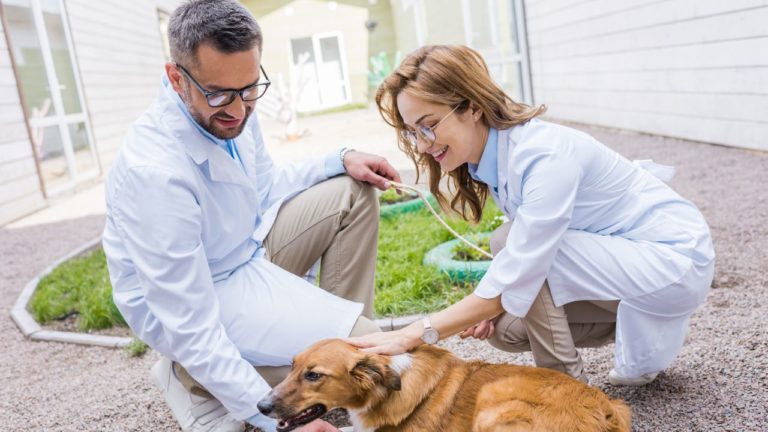How to Find The Best Vet for Your Dog
How do you know if a vet is good? What do people look for in a vet? What questions should you ask when interviewing a veterinarian?

Read Time: 7 minutes
Many of the strategies Demian Dressler, DVM (Dr. D) and Susan Ettinger, DVM, Dip. ACVIM (Oncology) (Dr. Sue) recommend in their best-selling book The Dog Cancer Survival Guide have potent effects on the body. For that reason, the authors want you to ask a veterinarian before you make any changes to your dog’s diet, medications, or supplements. But if you don’t have a regular vet — or if you are unhappy with your regular vet … how do you find the best vet?
How Do You Know If a Vet is Good?
What makes a veterinarian “good” will vary widely and depend upon what you like and need from a medical professional.
Humans are humans, so … not everyone likes the same vet.
- What sounds like a joke to one person sounds like a rude and smart-aleck comment to another.
- A warm and authoritative tone to one person sounds like a domineering jerk to another.
- A sweet, friendly, and interested question to one sounds intrusive and overly emotional to the next.
A few years ago I needed a surgery from my ob/gyn. I loved working with her. She had an in-charge, no-nonsense attitude, and I could tell she cared about my safety and most importantly, the success of the surgery. After I had the surgery I was so pleased that I told my book club about it. Five of the other members expressed surprise that I liked my doctor. They had found her cold and uncaring! Different folks, different needs, and different priorities make for different judgments.
Who was right about the ob/gyn? All of us. The same is true for veterinarians. As my grandmother once said “there’s a lid for every pot.”
Even though your veterinarian has authority and training in their field, YOU are in charge. You are the one paying for their services. That makes YOU the boss.
If your vet isn’t cutting it — either because she’s too dismissive, he’s not open-minded, or you don’t feel like he or she is the right fit — you should find a new veterinarian.
Let’s explore this a little.
Ask Your Veterinarian to Help You Find the Best Vet for You and Your Dog
Your existing general practice veterinarian is an excellent place to start, even if you don’t want to see them anymore.
Yup, it’s true: you can ask your current vet how to find the best vet. Don’t be afraid. This is your dog’s health and your money!
Yup, it’s true: you can ask your own vet how to find the best vet!
Most veterinarians understand that having good relationships with their clients is important to their business … even clients who won’t be coming anymore.
If asked, your vet should refer you to another professional with no fuss or outward upset of any kind. Anything else would be unprofessional.
Remember, veterinarians want what’s best for your dog, too. They would rather see your dog get someone else’s care than no care at all.
Veterinarians typically know other veterinarians in their area and can recommend someone who might fit you and your dog better.
Your veterinarian can also recommend a veterinary oncologist or a complementary (alternative or holistic) veterinarian for second opinions.
If your veterinarian can’t or won’t refer you to another veterinarian for a second opinion or more care, you can find a veterinarian in your area yourself. It may take some research, but it’s worth it.
Ask Other Dog Lovers How to Find the Best Vet
If you’re anything like me, you know all the dogs in your neighborhood. Next time you watch them sniff each other, look up to the other end of the leash and ask the human attached if they like their veterinarian and why or why not. Sometimes other dog lovers have fantastic insights into the veterinarians in your area.
You can also check this post about to see if readers of Dr. Dressler’s book have recommended a veterinarian in your area.
Ask Other Pet Professionals How to Find the Best Vet
Dog groomers, trainers, and even pet supply store staff all have experience with veterinarians in your area and can often advise you as to who might fit you and your dog.
How to Find a Veterinarian Oncologist
Many folks think that a veterinary oncologist is not necessary for dog cancer, and I understand why. After all, in many parts of the country (including my state) you can’t even find an oncologist near you. However, consulting with one is a good idea anyway. Here’s why.
Veterinary oncologists are experts on conventional approaches like surgery, chemotherapy, and radiation. They spend all day, every day, thinking about cancer and treating it using these tools. So if you’re even THINKING about using these for your dog’s case, getting an oncologist on your team is an excellent idea.
Think about it: if your doctor saw a weird spot on an X-ray and suspected cancer, he wouldn’t grab a scalpel and perform surgery. He’d refer out to an oncologist … someone with expertise and much more experience.
If your doctor saw a weird spot on an X-ray he would refer you to an oncologist.
The same is true for dog cancer.
Oncologists Obsess About Cancer and Can Save You Money
While the general practice veterinarian can handle a great deal of cancer care, including many surgeries, diet, nutraceuticals, supplements, and lifestyle management, she can’t often provide chemotherapy or radiation therapy. Many more complex surgeries should be handled by a board-certified surgeon, too.
You might think a specialist is too expensive — but maybe not. An oncologist may save you time and money.
You can find an oncologist by going to the American College of Veterinary Internal Medicine website and using the search feature.
Please remember that there are around 400 oncologists in North America (including Canada) and nearly 60,000 general practice veterinarians. Don’t be surprised if you can’t find someone in your local area!
If you can’t find a local oncologist, your veterinarian can often consult with one over email or phone. Your veterinarian will know how to contact an oncologist for advice, and it’s your right to ask him or her.
How to Find a Holistic or Integrative Veterinarian
You may wonder how to find the best vet who practices “beyond conventional medicine.” These veterinarians may focus on herbal preparations, acupuncture, supplements, and dietary recommendations, among many other options. They may call themselves “alternative,” “natural,” “holistic,” or some other term. We refer to them as “integrative” because their services integrate many types of veterinary care.
If you’re looking for in-depth advice on any part of Full Spectrum care that isn’t related to surgery, chemotherapy, or radiation, consulting with an integrative vet is a good idea.
Many have already worked alongside local oncologists. Some even do phone and email consults, which means your veterinarian could ask them for an opinion, or you could consult with them at a distance.
If you can’t find a complementary veterinarian by referral or asking other dog lovers, you can always go to the American Holistic Veterinary Medical Association and use the search feature.
What Questions to Ask When Choosing a Veterinarian
Hopefully, your research will turn up at least one, if not several, great leads for your new veterinarian. You may be ready to book an appointment right away, just based on word of mouth. That’s great!
However, if any part of you is skeptical about a new veterinarian you haven’t seen before, ask their staff if you can get a quick phone call from the doctor BEFORE your appointment. Explain that you want to have a quick conversation and ask a few questions before you come in, just to make sure it’s a good fit. Most veterinarians are happy to spend ten minutes on the phone with a new client to chat about your dog, what you think you need, and how they work.
This quick call or meeting is a great way to establish a relationship between you. You can check out whether they are a good communicator and whether you feel they are trustworthy. It also tells the veterinarian that you are a concerned, involved, and “good” client.
Questions you might want to ask your prospective veterinarian on this call include the following:
- Do you treat this condition at your clinic or refer out?
- How do you feel about making nutritional recommendations? What about using supplements?
- Do you have any special training or certifications I should know about?
- Do you go over costs upfront so that I can make informed decisions?
- If questions come up, are you or someone on your staff available by email or phone in between appointments? Do you charge for those?
- What kind of imaging equipment do you have at your hospital?
- What if I need help after hours?
- Do you provide emergency care at your hospital, or do I need to go to another hospital in an emergency?
If a veterinarian balks at questions or doesn’t want to answer directly, I personally consider that a red flag.
What to Look for During Your First Appointment
When you first get to your appointment, make a note of everything, including whether the place is easy to get to, how good the parking is, how friendly the staff is, and whether the waiting area looks clean and inviting.
Notice how the veterinary nurses or techs treat you and your pup. Do they get down on the floor with your dog? Do they seem relaxed and open, or stiff and overworked?
When you’re meeting with the veterinarian, do you feel you have her undivided attention? Does it feel like he’s rushing out the door … or wants to?
Do you like how you feel around them, or are you left confused or upset? Do you feel like she answered all your questions and spent enough time with you ensure you had everything covered?
Are costs reviewed with you so you know what to expect at checkout?
Does someone call you the next day to see how your appointment went, answer questions, and follow up on home treatment plans?
Questions to Ask About Cancer Treatments
When we call or visit the vet, we’re often distracted and confused and overwhelmed, so go prepared. Write down ALL of your questions, even the ones that seem obvious to you. That way, you won’t forget something important and feel weird about asking later.
Also, after your visit, make sure to sit down and make a list of new questions that came up for you. We always recommend using a journal to track your dog’s cancer journey.
Here are a few sample questions you might ask your current or prospective veterinarian:
- Is this cancer rare or common, and how many cases have you personally seen?
- If this treatment works, how much time will it gain us?
- If this treatment works, how much quality of life will it gain us?
- Are there any supplies or over-the-counter medications I will need at home for after-treatment care?
- How do I know if a side effect is severe enough to warrant a call for emergency care? How likely is that to happen?
- Do you think my dog is in pain? How will that be treated?
- Can I have a copy of my dog’s files and images?
There are dozens more questions in the chapter called “Working with Professionals and Loved Ones” in Part IV: Making Confident Choices. Look for those questions on page 260 of The Dog Cancer Survival Guide.
Bottom Line: Get Your Team Together
Just like dogs, humans are social creatures. We like to be part of a “pack.” So don’t be afraid to ask other health practitioners and veterinarians to be part of your pack of caregivers for your dog.
It will help you to feel secure in your decisions and avoid regrets later. Even just a courtesy conversation with a new veterinarian can help you to gain confidence in your plan.
Get help. Your dog is worth it!
Warm Aloha,
Molly Jacobson
Editor, The Dog Cancer Survival Guide
Editorial Note: This post was originally published on a retired blog about dog cancer.
Molly Jacobson
Topics
Did You Find This Helpful? Share It with Your Pack!
Use the buttons to share what you learned on social media, download a PDF, print this out, or email it to your veterinarian.
Editor's Picks
CATEGORY




